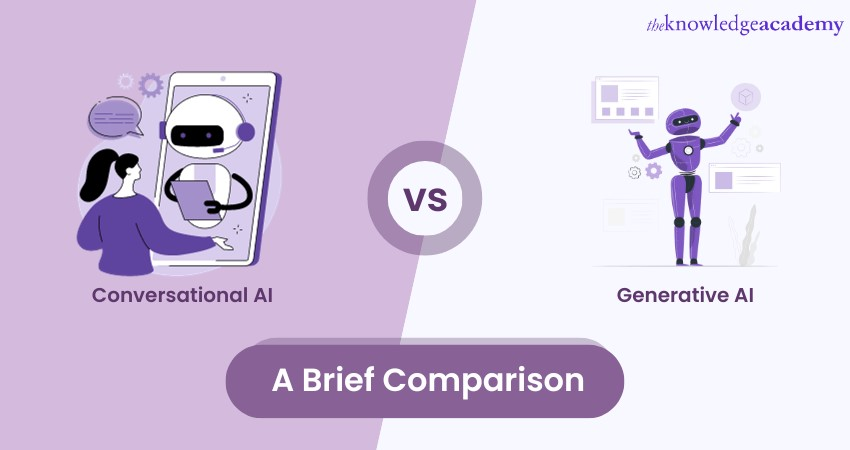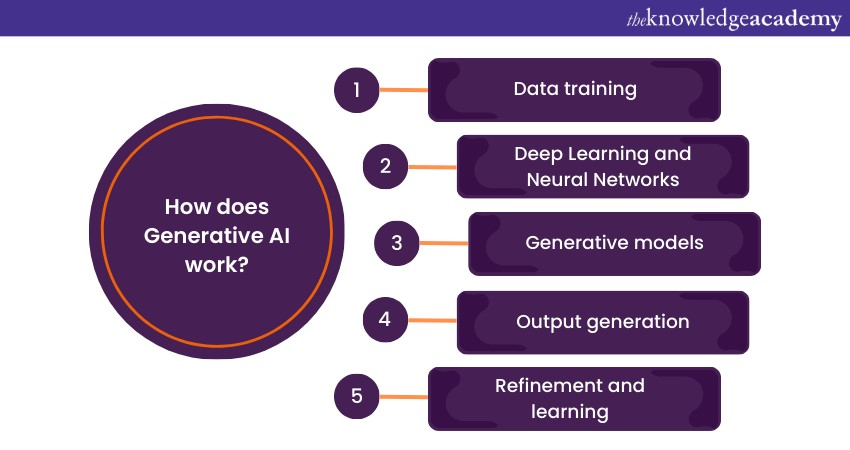We may not have the course you’re looking for. If you enquire or give us a call on +1 6474932992 and speak to our training experts, we may still be able to help with your training requirements.
Training Outcomes Within Your Budget!
We ensure quality, budget-alignment, and timely delivery by our expert instructors.

There are two particularly intriguing branches of Artificial Intelligence: Conversational AI and Generative AI. There are specific differences between Conversational AI vs Generative AI. Conversational AI is engineered to simulate human-like interactions, enabling machines to understand, process, and intuitively respond to human language.
On the other hand, Generative AI steps into a creative world with the ability to produce original content, ranging from text and images to music and videos. It's about more than just understanding or processing information; it's about creating it. In this blog, you will discover the subtle differences between Conversational AI vs Generative AI, and also how they work differently.
Table of Contents
1) What is Conversational AI?
2) Working of Conversational AI
3) What is Generative AI?
4) How does Generative AI work?
5) Differences between Conversational AI and Generative AI
6) Conclusion
What is Conversational AI?
Conversational AI is a branch of AI that enables machines to understand, process, and naturally respond to human language. It combines the elements of Natural Language Processing (NLP), Machine Learning, and contextual awareness to facilitate meaningful and coherent interactions between humans and machines.
This technology powers chatbots, Virtual Assistants, and voice-activated devices, allowing them to engage in human-like dialogues. By analysing and interpreting human speech or text inputs, Conversational AI can provide personalised responses, perform tasks, or offer assistance, which helps enhance user experiences across various platforms and applications, from customer service to personal assistants.

Working of Conversational AI
The workings of Conversational AI involve a complex interplay of technologies that enable machines to simulate human conversation. There are three primary components:
a) Natural Language Processing (NLP): This is the foundation of Conversational AI. NLP allows the system to understand and interpret human language by breaking down speech or text into comprehensible structures. It involves syntax analysis to understand grammar, semantic analysis to comprehend meaning, and context understanding to grasp the intent behind the words.
b) Machine Learning (ML): ML algorithms play a crucial role in enabling the AI to learn from interactions and improve over time. The system can recognise patterns, adapt to user preferences, and refine its responses through techniques like supervised and unsupervised learning. As more data is processed, the AI becomes better at predicting appropriate responses and handling a wide range of conversational scenarios.
c) Data and contextual awareness: For Conversational AI to be effective, it must have access to relevant data and understand the context of the conversation. This involves integrating with databases and external systems to retrieve information and using situational cues to provide contextually appropriate responses.
Are you interested in using the latest AI tools to boost productivity in your organisation? Register now for our Artificial Intelligence Tools Training!
What is Generative AI?
Generative AI is a subset of AI that focuses on creating new, original content, ranging from text and images to music and videos. Utilising advanced Machine Learning Techniques, particularly deep learning and neural networks, it can generate realistic and novel outputs that were not explicitly programmed.
This is achieved through training on large datasets, where the AI learns patterns, styles, and structures. It then uses this knowledge to produce new creations that mimic the known material. Generative AI has many applications, including artistic creation, content generation, and problem-solving, showcasing its versatility and creative potential.
Do you want to discover the transformative power of AI? Sign up now for our Generative AI For Operations Training Course!
How does Generative AI work?
Generative AI operates by learning from vast amounts of data and then using that knowledge to create new, original content. The process involves several key steps and technologies:

a) Data training: Generative AI systems are trained on large datasets, including text, images, sounds, or videos. This training involves exposing the AI to numerous examples from which it can learn patterns, styles, and structures.
b) Deep learning and neural networks: Generative AI involves deep learning algorithms and neural network architectures, such as Generative Adversarial Networks (GANs) or Variational Autoencoders (VAEs). These networks consist of layers of nodes that mimic the human brain's structure and function, enabling the AI to analyse and process complex data patterns.
c) Generative models: Using these neural networks, the AI develops generative models. In a GAN, for instance, there are two parts: the generator, which creates content, and the discriminator, which evaluates it against the real data. The generator produces outputs, and the discriminator assesses their authenticity, creating a feedback loop that continuously improves the quality and realism of the generated content.
d) Output generation: Once trained, the AI can generate new content. This could be anything from an image that resembles those it was introduced on to a piece of music in a particular style to coherent blocks of text.
e) Refinement and learning: Generative AI systems continue to learn and refine their outputs over time. As they are exposed to more data or receive feedback, they adjust their models to produce increasingly sophisticated and accurate outputs.
Learn to empower your Data Analysis skills with our Generative AI For Data Analyst Training Course!
Differences between Conversational AI and Generative AI
Here are some more differences between Conversational AI and Generative AI:
|
Aspect |
Conversational AI |
Generative AI |
|
Primary function |
Facilitates interaction and communication with users |
Creates new, original content (text, images, music, etc.) |
|
Core technology |
Natural Language Processing (NLP) and Machine Learning (ML) |
Deep Learning, Neural Networks (like GANs, VAEs) |
|
Data utilisation |
Processes and interprets human language inputs |
Learns patterns and styles from large datasets to create content |
|
Interaction type |
Reactive; responds to user inputs |
Creative; generates novel outputs without specific prompts |
|
Training focus |
Trained to understand and generate human-like responses |
Trained to recognise patterns and generate new, similar artefacts |
|
Output |
Generates responses and engages in dialogues |
Produces entirely new creations (art, text, etc.) |
|
Application examples |
Chatbots, virtual assistants, customer service tools |
Art and content creation, design, media generation |
|
Goal |
To simulate human-like conversations and interactions |
To push the boundaries of automated creativity and innovation |
|
Feedback mechanism |
Often uses user interactions for learning and improvement |
Uses internal evaluation (like discriminator in GANs) for learning |
Do you want to transform your Cloud expertise with AI? Register now for our Generative AI For Cloud Professional Training Course!
Conclusion
We hope that you understood the differences between Conversational AI vs Generative AI. Conversational AI and Generative AI represent two distinct facets of AI, where each is used because of its unique capabilities. While Conversational AI excels in simulating human dialogue and enhancing user interaction, Generative AI breaks new ground in creative content generation, demonstrating AI technologies' diverse and dynamic nature.
Learn how to enhance your Business Analysis capabilities with our Generative AI For Business Analyst Training Course!
Frequently Asked Questions
Upcoming Data, Analytics & AI Resources Batches & Dates
Date
 Generative AI Course
Generative AI Course
Fri 10th Jan 2025
Fri 14th Feb 2025
Fri 11th Apr 2025
Fri 23rd May 2025
Fri 8th Aug 2025
Fri 26th Sep 2025
Fri 21st Nov 2025







 Top Rated Course
Top Rated Course


 If you wish to make any changes to your course, please
If you wish to make any changes to your course, please


